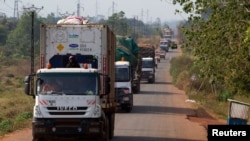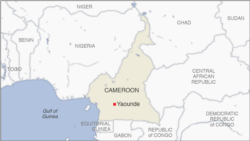The trucking of goods and humanitarian aid from Cameroon to the landlocked Central African Republic has slowed to a trickle, raising tensions between the two sides. Despite an agreement that Cameroon drivers who test negative for COVID-19 would be given access, testing kits are in short supply at the border, forcing some trucks to wait weeks to cross.
El Hadj Oumarou, the head of Cameroon’s land freight transportation bureau, says hundreds of trucks at the border town of Garoua Boulay have not been given access to the Central African Republic.
He says all attempts to convince C.A.R. transport and health officials that the drivers have tested negative for COVID-19 in Cameroon have failed.
Oumarou says this week, Cameroon's transport minister assured truck drivers that the C.A.R. will accept COVID-19 test results done in Cameroon hospitals. But Oumarou says, the COVID-19 test results done in Cameroon are still rejected by C.A.R. border officials. He says he is scandalized that trucks, goods and humanitarian aid are blocked at the border for several weeks.
The C.A.R. and Cameroon sealed their borders in March to stop the spread of the coronavirus, after both countries recorded cases of COVID-19. The landlocked C.A.R. entered an agreement with Cameroon to allow passage of humanitarian aid and goods from Cameroon’s seaside town of Douala to the C.A.R. capital, Bangui.
According to the agreement, only truck drivers who tested negative for COVID-19 were to enter the C.A.R. But the plan was crippled by a shortage of tests at the border.
The drivers, who are mostly Cameroonians, started carrying out the tests in local hospitals.
But C.A.R. officials began rejecting the results last month when the number of confirmed COVID-19 cases in Cameroon increased to more than 13,000.
On Monday of this week, delegates from the two countries held a crisis meeting at Garoua Boulay, and the C.A.R. agreed to recognize COVID-19 test results carried out in Cameroon.
But C.A.R. Transport Minister Arnaud Djoubaye Abazene says the decisions made at the meeting were not final.
Abazene says the mixed commission that the presidents of Cameroon and C.A.R. created to manage land transport will meet to examine threats caused by COVID-19. He says only that the commission can address all the misunderstandings caused at the border as a result of the coronavirus pandemic.
Abazene said that once goods and supplies are brought to the border, C.A.R. drivers will transport them to Bangui.
He said his country will also consider COVID-19 test results conducted in the C.A.R. in case the border posts run short of rapid diagnostic tests.
Cameroon's minister of transport, Jean Earnest Ngale Bibehe, says Cameroon wants a solution to the crisis as soon as possible.
He says the coronavirus pandemic preoccupies all governments in the world and there is no state that will want to joke over COVID-19. He says it is in the interest of Cameroon and the C.A.R. to work together and rescue their collapsing economies.
The Central African Republic depends on the Douala seaport for about 95 percent of its goods and humanitarian aid.





